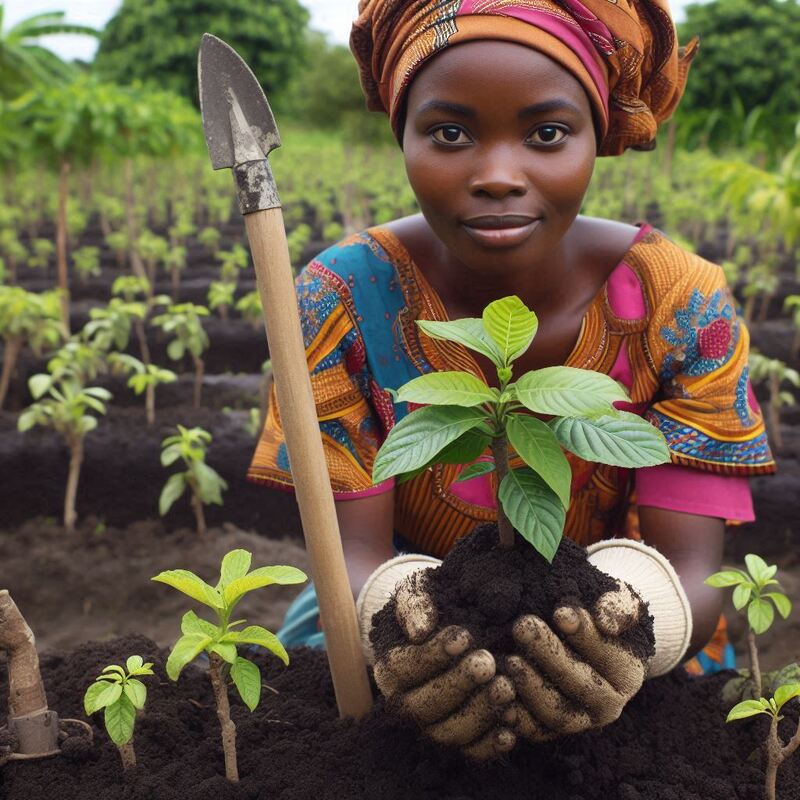
Access to resources and support is crucial for farmers looking to improve soil health. Various organizations, programs, and institutions across Africa provide valuable assistance in this regard. Here’s a detailed look at how farmers can access these resources and support systems:
Agricultural Extension Services
Government agricultural extension services are a primary resource for farmers. These services offer training, information, and technical assistance on soil health improvement practices.
– Nigeria: The Federal Ministry of Agriculture and Rural Development (FMARD) runs extension services that provide farmers with information on soil management, organic farming, and sustainable agricultural practices. Extension officers visit farms, conduct soil tests, and recommend suitable practices to improve soil health.
– Kenya: The Kenya Agricultural and Livestock Research Organization (KALRO) offers extension services that include soil testing, training on the use of organic fertilizers, and advice on crop rotation and cover cropping.
Non-Governmental Organizations (NGOs)
Several NGOs work with farmers to improve soil health by providing resources, training, and support.
– AGRA (Alliance for a Green Revolution in Africa): AGRA works across multiple African countries, offering training programs on soil fertility management, distributing organic fertilizers, and supporting sustainable farming practices. Their Soil Health Program has reached over 4 million farmers, improving soil health and crop yields.
– Heifer International: In countries like Uganda and Tanzania, Heifer International provides training on sustainable agricultural practices, including composting and agroforestry. They also distribute livestock, which can contribute to soil health through manure production.
Research Institutions and Universities
Research institutions and universities play a vital role in developing and disseminating knowledge on soil health improvement.
– International Institute of Tropical Agriculture (IITA): Headquartered in Nigeria, IITA conducts research on soil health and provides training and resources to farmers. They develop and promote best practices for soil management, including the use of bio-fertilizers and improved crop varieties.
– University of Ibadan, Nigeria: The university’s Department of Agronomy conducts research on soil health and offers training programs for farmers on sustainable agricultural practices.
Development Projects and Programs
Various development projects funded by international organizations provide resources and support for soil health improvement.
– Feed the Future (USAID): This U.S. government initiative works in several African countries, including Nigeria. The Feed the Future Nigeria Agricultural Policy Project focuses on improving soil health through the promotion of sustainable agricultural practices, soil testing services, and farmer training programs.
– The Soil Health Program by the International Fertilizer Development Center (IFDC): This program operates in several African countries, providing farmers with training on the efficient use of fertilizers, soil testing, and the adoption of integrated soil fertility management practices.
Local Cooperatives and Farmer Associations
Local cooperatives and farmer associations often provide support and resources to their members.
– Farmer Field Schools (FFS): These schools, often run by local cooperatives or NGOs, offer hands-on training for farmers on various aspects of soil health, including composting, crop rotation, and pest management.
– Women Farmers Advancement Network (WOFAN): In Nigeria, WOFAN empowers women farmers by providing training on sustainable farming practices, including soil health management. They offer resources such as organic fertilizers and access to soil testing services.
Access to Credit and Financial Support
Improving soil health often requires financial investment, and various programs offer financial support to farmers.
– Nigeria Incentive-Based Risk Sharing System for Agricultural Lending (NIRSAL): This initiative provides credit guarantees and financial support to farmers for purchasing inputs like organic fertilizers and soil amendments.
– Microfinance Institutions: Many microfinance institutions in Africa offer loans specifically designed for agricultural purposes, enabling farmers to invest in soil health improvement practices.
Online Resources and Digital Platforms
Digital technology is increasingly being used to provide farmers with information and support.
– e-extension Platforms: In Kenya, platforms like e-Granary provide farmers with access to soil health information, weather updates, and market information via mobile phones.
– Digital Green: This organization uses video-based training to teach farmers about sustainable agricultural practices, including soil health management. Their programs are available in several African countries, including Ethiopia and Tanzania.
Conclusion
Farmers in Nigeria and across Africa have a wealth of resources and support systems available to help them improve soil health. By leveraging government extension services, NGO programs, research institutions, development projects, local cooperatives, financial support, and digital platforms, farmers can access the knowledge, tools, and funding necessary to enhance soil fertility and productivity.
Investing in soil health is a crucial step towards sustainable agriculture and improved livelihoods for farmers. As the demand for sustainable farming practices grows, the availability of resources and support continues to expand, providing farmers with the opportunities they need to succeed.


